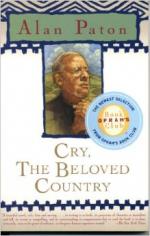|
This section contains 1,309 words (approx. 5 pages at 300 words per page) |

|
The Nature and Function of Symbolism in Cry, the Beloved Country
Summary: A discussion of the way structure, language and style has been used to develop symbolism and suggest a solution to South Africa's problems of racial segregation and hatred in Alan Paton's novel 'Cry, The Beloved Country'.
Symbolism is no mere idle fantasy or corrupt egerneration: it is inherent to the very texture of human life. Paton shows this is true in his novel of social protest, Cry the Beloved Country, using it to reveal the very nature of human life and offer a solution to the problems of social injustice and inequality in South Africa.
The parallel structure of the first chapter symbolises the diametrically opposed worlds of the blacks and the whites. The white people live up in the hills, where "the grass is rich and matted," "it is well tended and not too many cattle feed upon it." This is symbolic of their wealth and power. But these "rich green hills breakdown," the earth becomes "red and bare." These are the valleys of the black people, where " the maize hardly reaches the height of a man." "Stand shod upon it, for it...
|
This section contains 1,309 words (approx. 5 pages at 300 words per page) |

|


